最新英语泛读教程4--课文翻译
泛读4课文翻译
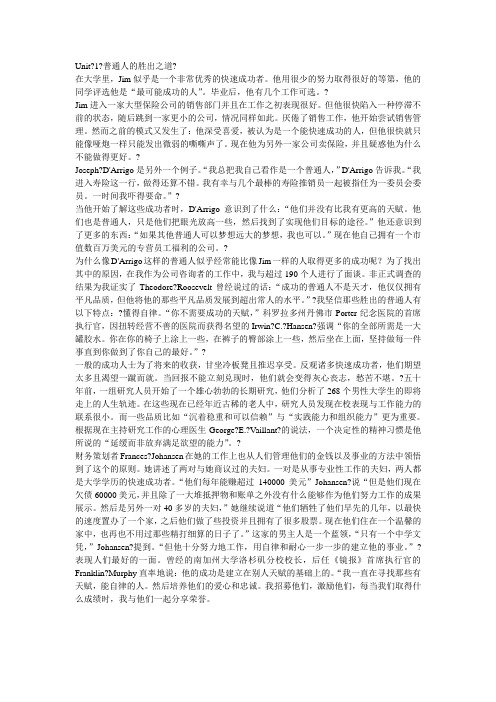
Unit?1?普通人的胜出之道?在大学里,Jim似乎是一个非常优秀的快速成功者。
他用很少的努力取得很好的等第,他的同学评选他是“最可能成功的人”。
毕业后,他有几个工作可选。
?Jim进入一家大型保险公司的销售部门并且在工作之初表现很好。
但他很快陷入一种停滞不前的状态,随后跳到一家更小的公司,情况同样如此。
厌倦了销售工作,他开始尝试销售管理。
然而之前的模式又发生了:他深受喜爱,被认为是一个能快速成功的人,但他很快就只能像哑炮一样只能发出微弱的嘶嘶声了。
现在他为另外一家公司卖保险,并且疑惑他为什么不能做得更好。
?Joseph?D'Arrigo是另外一个例子。
“我总把我自己看作是一个普通人,”D'Arrigo告诉我。
“我进入寿险这一行,做得还算不错。
我有幸与几个最棒的寿险推销员一起被指任为一委员会委员。
一时间我吓得要命。
”?当他开始了解这些成功者时,D'Arrigo意识到了什么:“他们并没有比我有更高的天赋。
他们也是普通人,只是他们把眼光放高一些,然后找到了实现他们目标的途径。
”他还意识到了更多的东西:“如果其他普通人可以梦想远大的梦想,我也可以。
”现在他自己拥有一个市值数百万美元的专营员工福利的公司。
?为什么像D'Arrigo这样的普通人似乎经常能比像Jim一样的人取得更多的成功呢?为了找出其中的原因,在我作为公司咨询者的工作中,我与超过190个人进行了面谈。
非正式调查的结果为我证实了Theodore?Roosevelt曾经说过的话:“成功的普通人不是天才,他仅仅拥有平凡品质,但他将他的那些平凡品质发展到超出常人的水平。
”?我坚信那些胜出的普通人有以下特点:?懂得自律。
“你不需要成功的天赋,”科罗拉多州丹佛市Porter纪念医院的首席执行官,因扭转经营不善的医院而获得名望的Irwin?C.?Hansen?强调“你的全部所需是一大罐胶水。
你在你的椅子上涂上一些,在裤子的臀部涂上一些,然后坐在上面,坚持做每一件事直到你做到了你自己的最好。
英语泛读4全文翻译

1.天才与工匠许多人羡慕作家们的精彩小说,但却很少有人知道作家们是如何辛勤笔耕才使一篇小说问世的。
以下的短文将讨论小说的酝酿过程,以及作家是如何将这小说雕琢成一件精致完美的艺术品。
有一次,我在暮色中来到小树林边一棵鲜花盛开的小桃树前。
我久久站在那里凝视着,直到最后一道光线消逝。
我看不到那树原先的模样,看不见曾穿透果核,能崩碎你的牙齿的力量,也看不到那使它与橡树和绿草相区别的原则。
显现在我面前的,是一种深邃而神秘的魅力。
当读者读到一部杰出的小说时,他也会这样如痴如狂,欲将小说字字句句刻骨铭心,不提出任何问题。
但即使是个初学写作者也知道,除那将小说带到世上的文字之外,还有更多的构成小说生命的因素,小说的生命并不始于写作,而始于内心深处的构思。
要创作出有独创性的作品,并不要求懂得创造的功能。
多少世纪以来的艺术、哲学及科学创造都出自人们的头脑,而创造者也许从未想到去关注创造的内在过程。
然而,在我看来,对创造工作一定程度的了解,至少会使我们通过知道两个事实,增长我们处理正在出现的故事的智慧。
首先,天赋不是掌握了技艺的艺术家独有的特性,而是人脑的创造性功能。
不仅所有对技艺的掌握都含有天赋,而且每个人都具有天赋,无论他的天赋发展是何等不充分。
对技艺的掌握是天赋的显现,是经过培养的,发展了的和受过训练的天赋。
你的天赋在最原始的层面上起作用。
它的任务就是创造。
它是你的故事的创造者。
第二,将你的小说带进世界的文字是艺术家的工作,它就和一个泥瓦匠的工作一样,有意识、谨慎而实实在在。
天赋正如理解力、记忆力和想象力一样是我们的精神禀赋中的天然部分,而技艺却不是。
它必须通过实践才能学到,并要通过实践才能掌握。
如果要使在我们内心深处浮现的故事跃然纸上,光彩照人,那么,每个故事都须有感染力极强的优雅文笔。
只有健全的技艺才能使我们做到这一点。
一个故事是如何酝酿成的呢?据说,我们从一生中的前二十年,或许前五年起就开始写作。
这可能取决于个人,而写作中的很多事都取决于个人。
英语泛读教程4unit2ThreeDaystoSee课文和译文
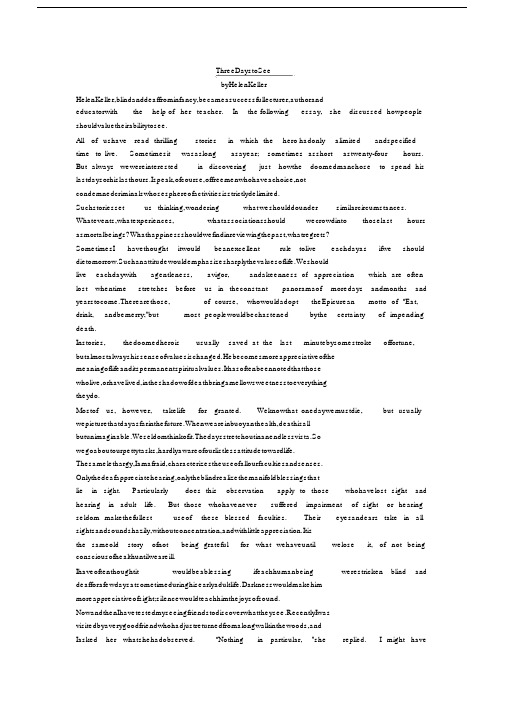
---------ThreeDaystoSeebyHelenKellerHelenKeller,blindanddeaffrominfancy,becameasuccessfullecturer,authorandeducatorwith the help of her teacher.In the following essay,she discussed howpeople shouldvaluetheirabilitytosee.All of ushave read thrilling stories in which the hero hadonly alimited andspecified time to live.Sometimesit wasaslong asayear;sometimes asshort astwenty-four hours. But always wewereinterested in discovering just howthe doomedmanchose to spend his lastdaysorhislasthours.Ispeak,ofcourse,offreemenwhohaveachoice,not condemnedcriminalswhosesphereofactivitiesisstrictlydelimited.Suchstoriesset us thinking,wondering what weshoulddounder similarcircumstances. Whatevents,whatexperiences,whatassociationsshould wecrowdinto thoselast hours asmortalbeings?Whathappinessshouldwefindinreviewingthepast,whatregrets?SometimesI havethought itwould beanexcellent rule tolive eachdayas ifwe should dietomorrow.Suchanattitudewouldemphasizesharplythevaluesoflife.Weshouldlive eachdaywith agentleness,avigor,andakeenness of appreciation which are often lost whentime stretches before us in theconstant panoramaof moredays andmonths and yearstocome.Therearethose,of course,whowouldadopt theEpicurean motto of“Eat, drink,andbemerry;”but most peoplewouldbechastened bythe certainty of impending death.Instories,thedoomedherois usually saved at the last minutebysomestroke offortune, butalmostalwayshissenseofvaluesischanged.Hebecomesmoreappreciativeofthe meaningoflifeanditspermanentspiritualvalues.Ithasoftenbeennotedthatthosewholive,orhavelived,intheshadowofdeathbringamellowsweetnesstoeverythingtheydo.Mostof us,however,takelife for granted.Weknowthat onedaywemustdie,but usually wepicturethatdayasfarinthefuture.Whenweareinbuoyanthealth,deathisallbutunimaginable.Weseldomthinkofit.Thedaysstretchoutinanendlessvista.Sowegoaboutourpettytasks,hardlyawareofourlistlessattitudetowardlife.Thesamelethargy,Iamafraid,characterizestheuseofallourfacultiesandsenses. Onlythedeafappreciatehearing,onlytheblindrealizethemanifoldblessingsthatlie in sight.Particularly does this observation apply to those whohavelost sight and hearing in adult life.But those whohavenever suffered impairment of sight or hearing seldom makethefullest useof these blessed faculties.Their eyesandears take in all sightsandsoundshazily,withoutconcentration,andwithlittleappreciation.Itisthe sameold story ofnot being grateful for what wehaveuntil welose it,of not being consciousofhealthuntilweareill.Ihaveoftenthoughtit wouldbeablessing ifeachhumanbeing werestricken blind and deafforafewdaysatsometimeduringhisearlyadultlife.Darknesswouldmakehimmoreappreciativeofsight;silencewouldteachhimthejoysofsound. NowandthenIhavetestedmyseeingfriendstodiscoverwhattheysee.RecentlyIwas visitedbyaverygoodfriendwhohadjustreturnedfromalongwalkinthewoods,andIasked her whatshehadobserved.“Nothing in particular,”she replied.I might havebeenincreduloushadInotbeenaccustomedtosuchresponses,forlongagoIbecame convincedthattheseeingseelittle.Howwasit possible,I askedmyself,to walkfor anhour through the woodsandseenothing worthyofnote?Iwhocannotseefindhundredsofthingstointerestmethroughmeretouch.I feel the delicate symmetry of aleaf.I passmyhandslovingly aboutthesmooth skin of asilver birch,or therough shaggybark of apine.Inspring I touch the branches oftreeshopefullyinsearchofabud,thefirstsignofawakeningNatureafterherwinter'ssleep.Ifeelthedelightful,velvetytextureofaflower,anddiscoveritsremarkableconvolutions;andsomethingofthemiracleofNatureisrevealedtome.Occasionally,ifIamveryfortunate,Iplacemyhandgentlyonasmalltreeandfeelthe happy quiver of abird infull song.Iamdelighted to have the cool waterofabrook rushthroughmyopenfingers.Tomealushcarpetofpineneedlesorspongygrassis morewelcomethanthemostluxuriousPersianrug.Tomethepageantofseasonsisa thrillingandunendingdrama,theactionofwhichstreamsthroughmyfingertips. Attimesmyheartcriesoutwithlongingtoseeallthesethings.IfIcangetsomuchpleasurefrommeretouch,howmuchmorebeautymustberevealedbysight.Yet,those whohaveeyesapparentlyseelittle.Thepanoramaofcolourandactionwhichfillstheworldistakenforgranted.Itishuman,perhaps,toappreciatelittlethatwhichwe haveandtolongforthatwhichwehavenot,butitisagreatpitythatintheworld oflightthegiftofsightisusedonlyasamereconvenienceratherthanasameansofaddingfullnesstolife.If I were the president of auniversity Ishould establish acompulsory course in“How toUseYour Eyes”.Theprofessorwouldtrytoshowhispupilshowtheycouldaddjoyto their lives byreally seeing what passesunnoticed before them.Hewould try to awake theirdormantandsluggishfaculties. Supposeyousetyourmindtoworkontheproblemofhowyouwoulduseyourowneyesif youhadonlythreemoredaystosee.Ifwiththeoncomingdarknessofthethirdnight youknewthatthesunwouldneverriseforyouagain,howwouldyouspendthosethree preciousinterveningdays?Whatwouldyoumostwanttoletyourgazerestupon?I,naturally,shouldwantmosttoseethethingswhichhavebecomedeartomethroughmyyears ofdarkness.You,too,wouldwantto let your eyes rest long onthe things that havebecomedear to yousothat you could take the memoryof themwith youinto the night thatloomedbeforeyou. Ishouldwanttoseethepeoplewhosekindnessandgentlenessandcompanionshiphave mademylifeworthliving.FirstIshouldliketogazelonguponthefaceofmydearteacher,Mrs.AnneSullivan Macy,whocameto mewhenIwasachild andopenedthe outer worldtome.Ishouldwantnotmerelytoseetheoutlineofherface,sothatIcouldcherishitinmymemory,buttostudythatfaceandfindinitthelivingevidenceofthe sympathetic tenderness andpatience with whichsheaccomplished the difficult tasks ofmyeducation.Ishouldliketoseeinhereyesthatstrengthofcharacterwhichhasenabledh ertostandfirminthefaceofdifficulties,andthatcompassionforallhumanitywhichshehasre vealedtomesooften.---------Idonotknowwhatitistoseeintotheheartofafriendthroughthat“windowofthe soul”,the eye.Icanonly“see”through myfingertips the outlineof aface.Ican detectlaughter,sorrow,andmanyotherobviousemotions.Iknowmyfriendsfromthefeeloftheirfaces.ButIcannotreallypicturetheirpersonalitiesbytouch.Iknowtheir personalities,of course,through other means,throughthe thoughts they express tome,throughwhatever of their actions are revealed to me.ButI amdenied that deeper understanding ofthemwhichIamsurewould comethrough sight of themthrough watching theirreactionstovariousexpressedthoughtsandcircumstances,throughnotingthe immediateandfleetingreactionsoftheireyesandcountenance.Friends whoare nearto meIknowwell,because through themonths andyears they reveal themselvestomeinalltheirphases;butofcausalfriendsIhaveonlyanincompleteimpression,animpressiongainedfromahandclasp,fromspokenwordswhichItakefrom theirlipswithmyfingertips,orwhichtheytapintothepalmofmyhand.Howmucheasier,howmuchmoresatisfyingitisforyouwhocanseetograspquicklytheessential qualities of anotherpersonbywatching thesubtleties ofexpression,the quiverofamuscle,theflutterofahand.Butdoesiteveroccurtoyoutouseyoursight to seeinto the inner nature ofafriend oracquaintance?Donotmost of youseeing peoplegraspcasuallytheoutwardfeaturesofafaceandletitgoatthat?Forinstance,canyoudescribeaccuratelythefacesoffivegoodfriends?Someofyoucan,but manycannot.Asanexperiment,Ihavequestioned husbandsoflongstanding about thecoloroftheirwives'eyes,andoftentheyexpressembarrassedconfusionandadmitthat theydonot know.And,incidentally,it is achronic complaint ofwives that their husbandsdonotnoticenewdresses,newhats,andchangesinhouseholdarrangements.Theeyes of seeingpersons soonbecomeaccustomedtothe routine oftheir surroundings, andtheyactuallyseeonlythestartlingandspectacular.Buteveninviewingthemost spectacularsightstheeyesarelazy.Courtrecordsrevealeverydayhowinaccurately“eyewitnesses”see.Agiveneventwillbe“seen”in severaldifferentwaysbyas manywitnesses.Someseemorethanothers,butfewseeeverythingthatiswithintherangeoftheirvision.Oh,thethingsthatIshouldseeifIhadthepowerofsightforjustthreedays!(1634words)译文假如我有三天光明海伦·凯勒作家及教育家。
新编大学英语四泛读课文翻译
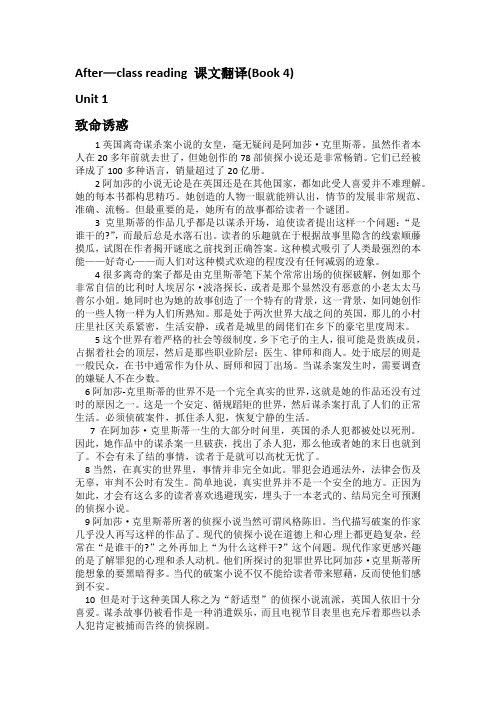
After—class reading 课文翻译(Book 4)Unit 1致命诱惑1英国离奇谋杀案小说的女皇,毫无疑问是阿加莎·克里斯蒂。
虽然作者本人在20多年前就去世了,但她创作的78部侦探小说还是非常畅销。
它们已经被译成了100多种语言,销量超过了20亿册。
2阿加莎的小说无论是在英国还是在其他国家,都如此受人喜爱并不难理解。
她的每本书都构思精巧。
她创造的人物一眼就能辨认出,情节的发展非常规范、准确、流畅。
但最重要的是,她所有的故事都给读者一个谜团。
3克里斯蒂的作品几乎都是以谋杀开场,迫使读者提出这样一个问题:“是谁干的?”,而最后总是水落石出。
读者的乐趣就在于根据故事里隐含的线索顺藤摸瓜,试图在作者揭开谜底之前找到正确答案。
这种模式吸引了人类最强烈的本能——好奇心——而人们对这种模式欢迎的程度没有任何减弱的迹象。
4很多离奇的案子都是由克里斯蒂笔下某个常常出场的侦探破解,例如那个非常自信的比利时人埃居尔·波洛探长,或者是那个显然没有恶意的小老太太马普尔小姐。
她同时也为她的故事创造了一个特有的背景,这一背景,如同她创作的一些人物一样为人们所熟知。
那是处于两次世界大战之间的英国,那儿的小村庄里社区关系紧密,生活安静,或者是城里的阔佬们在乡下的豪宅里度周末。
5这个世界有着严格的社会等级制度。
乡下宅子的主人,很可能是贵族成员,占据着社会的顶层,然后是那些职业阶层:医生、律师和商人。
处于底层的则是一般民众,在书中通常作为仆从、厨师和园丁出场。
当谋杀案发生时,需要调查的嫌疑人不在少数。
6阿加莎-克里斯蒂的世界不是一个完全真实的世界,这就是她的作品还没有过时的原因之一。
这是一个安定、循规蹈矩的世界,然后谋杀案打乱了人们的正常生活。
必须侦破案件,抓住杀人犯,恢复宁静的生活。
7在阿加莎·克里斯蒂一生的大部分时问里,英国的杀人犯都被处以死刑。
因此,她作品中的谋杀案一旦破获,找出了杀人犯,那么他或者她的末日也就到了。
英语泛读教程4文章翻译及答案 完整版
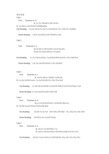
课文答案Unit 1Text: Exercises A. dB. 1.c 2.c 3.b 4.d 5.c 6.b 7.b 8.aD. 1.a 2.b 3.c 4.d 5.b 6.d 7.d 8.b9.a10.aFast Reading: 1.a 2.a 3.d 4.c 5.c 6.d 7.c 8.d 9.d 10.c 11.c 12.b 13.c 14.d15.aHome Reading: 1.d 2.c 3.a 4.d 5.c 6.d 7.b 8.b 9.c 10.aUnit 2Text: Exercises A. aB.1.b 2.b 3.c 4.b 5.d 6.b 7.a 8 .b 9.a 10.cD.1.b 2.a 3.a 4.a 5.b 6.a 7.c 8.d 9.cFast Reading: 1.a 2.c 3.d 4.a 5.b 6.c 7.a 8.d 9.d 10.b 11.d 12.c 13.c 14.d 15.bHome Reading: 1.d .2.a 3.d 4.d 5.b 6.d 7.c 8.c 9.d 10.dUnit 3Text: Exercises A. cB. 1.b 2.a 3.b 4.c 5.d 6.b 7.a 8.b 9.bD. 1.a 2.a 3.d 4.b 5.a 6.c 7.c 8.a 9.d 10.b 11.c 12.c 13.a 14.dFast Reading: 1.c 2.b 3.b 4.a 5.b 6.b 7.a 8.d 9.b 10.b 11.b 12.b 13.d 14.a 1 5.dHome Reading: 1.c 2.a 3.a 4.b 5.a 6.b 7.d 8.c 9.bUnit 4Text: Exercises A. bB.1.c 2.d 3.b 4.d 5.b 6.c 7.a 8.d 9.b 10.d 11.cD. 1.d 2.b 3.a 4.a 5.b 6.d 7.b 8.a 9.b 10.dFast Reading: 1.d 2.b 3.c 4.c 5.d 6.b 7.d 8.c 9.b 10.d 11.c 12.a 13.c 14.c 15.d Home Reading: 1.d 2.d 3.c 4.c 5.a 6.d 7.b 8.aUnit 5Text: Exercises A. aB. 1.b 2.c 3.a 4.d 5.b 6.c 7.aD. 1.d 2.c 3.d 4.a 5.b 6.a 7.b 8.d 9.a 10.d 11.b 12.c 13.aFast Reading: 1.b 2.c 3.a 4.c 5.d 6.a 7.c 8.b 9.d 10.c 11.a 12.c 13.c 14.c 15.cHome Reading: 1.c 2.b 3.a 4.d 5.a 6.d 7.b 8.c 9.c 10.aUnit 6Text: Exercises A. bB. 1.b 2.d 3.a 4.a 5.c 6.b 7.c 8.dD. 1.d 2.c 3.a 4.a 5.d 6.c 7.d 8.d 9.b 10.a 11.b 12.cFast Reading: 1.c 2.a 3.d 4.b 5.a 6.b 7.c 8.d 9.a 10.b 11.b 12.d 13.a 14.c 15.cHome Reading: 1.c 2.a 3.b 4.d 5.b 6.a 7.c 8.a 9.c 10.bUnit 7Text: Exercises A. cB. 1.c 2.a 3.a 4.b 5.d 6.a 7.b 8.cD. 1.a 2.d 3.c 4.d 5.a 6.a 7.b 8.b 9.c 10.d 11.a 12.b 13.cFast Reading: 1.a 2.d 3.c 4.b 5.a 6.d 7.b 8.d 9.c 10.b 11.d 12.b 13.b 14.c 15.dHome Reading: 1.d 2.d 3.b 4.d 5.c 6.a 7.b 8.a 9.b 10.cUnit 8Text: Exercises c.B. 1.d 2. c 3.b 4.b 5 a. 6. c 7.a 8.cD. 1. c2.d 3.a 4. c 5. a 6. b 7. d 8. c 9. b 10.b 11.d 12.d 13.d 14.c 15.dFast Reading: 1.a 2.c 3. a 4. a 5. d 6. b 7c . 8. d 9. d 10. c 11.d 12. d 13. d 14.c 15.d Home Reading: 1.a 2. d 3. d 4.d 5.b 6.c 7.d 8. bUnit 9Text: Exercises A. bB. 1.b 2.a 3.d 4.c 5.d 6.a 7.b 8.cD. 1.a 2.c 3.b 4.a 5.c 6.d 7.a 8.b 9.c 10.a 11.c 12.a 13.b 14.c 15.a 16.c17.d 18.b 19.aFast Reading: 1.a 2.ac3.c 4.d 5.b 6.a 7.b 8.c 9.c 10.d 11.c 12.b 13.c 14.a 15.dHome Reading: 1.b 2.c 3.d 4.a 5.c 6.b 7.d 8.a 9.d 10.dUnit 10Text: Exercises A. cB. 1.c 2.b 3.b 4.c 5.b 6.c 7.b 8.b 9.c 10.cD. 1.b 2.a 3.c 4.b 5.a 6.d 7.d 8.a 9.c 10.a 11.c 12.b 13.b 14.aFast Reading: 1.a 2.b 3.b 4.d 5.a 6.c 7.b 8.b 9.d 10.a 11.d 12.c 13.d 14.d 15.bHome Reading: 1.c2.c 3.c4.a 5.d 6.b 7.d 8.d 9.b 10.cUnit 11Text: Exercises A. bB. 1.b 2.a 3.a 4.c 5.d 6.c 7.b 8.cD. 1.d 2.a 3.a 4.d 5.b 6.c 7.b 8.a 9.c 10.aFast Reading: 1.c 2.a 3.b 4.d 5.d 6.a 7.c 8.c 9.d 10.a 11.c 12.c 13.d 14.d 15.bHome Reading: 1.c 2.a 3.c 4.a 5.d 6.b 7.a 8.b 9.a 10.cUnit 12Text: Excises A. bB. 1.d 2.a 3.b 4.d 5.d 6.b 7.c 8.d 9.cD. 1.b 2.a 3.a 4.b 5.b 6.c 7.a 8.b 9.c 10.b 11.b 12.a 13.c 14.b 15.aFast Reading: 1.d 2.d 3.b 4.b 5.b 6.d 7.d 8.c 9.b 10.c 11.c 12.b 13.c 14.d 15.aHome Reading: 1.d 2.c 3.c 4.b 5.d 6.b 7.cUnit 13Text: Exercises bB. 1.a 2.b3.b 4.d5.c 6.a 7. c 8.c 9.cD. 1.a 2.b 3.b 4.a 5.b 6.d 7.a 8.c 9. c10.c 11. d 12. b 13.d 14.aFast Reading: 1.d 2.a 3.d 4.d5.d 6.c 7.b 8.c 9.a 10.a 11.c 12.b 13.b 14.d 15.dHome Reading: 1.b 2.c 3.d 4.c 5.c 6.b 7.cd 8.a d.a 10.b 11.dUnit 14Text: Exercises cB. 1c. 2.d 3.b 4.b 5.d 6.d 7.c 8.d 9.d 10.dD. 1.c. 2.d 3.b 4.a 5. d 6.d 7.a 8. a 9.b 10.a 11.c 12.a 13.a 14.d Fast Reading: 1.a 2.c 3.b 4. a 5.d 6.d 7. d 8.b 9.c 10. c 11.d 12.b 13.c 14. d15.bHome Reading: 1. c2. c 3. c 4. a 5.a 6. c 7.c 8.dUnit 15Text: Exercises A. bB. 1.a 2.d 3.c 4.c 5.a 6.c 7.d 8.b 9.bD. 1.a 2.b 3.c 4.c 5.a 6.b 7.a 8.a 9.d 10.bFast Reading: 1.a 2.c 3.d 4.b 5.a 6.b 7.c 8.c 9.d 10.c 11.c 12.b 13.a 14.d 15.dHome Reading: 1.a 2.c 3.d 4.b 5.c 6.d 7.d 8.b 9.课后翻译Unit 1Text天才与工匠许多人羡慕作家们的精彩小说,但却很少有人知道作家们是如何辛勤笔耕才使一篇小说问世的。
英语泛读教程4第三版翻译
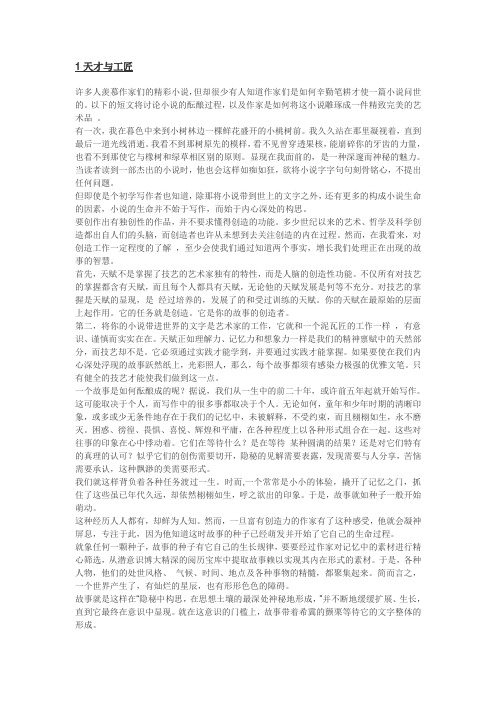
1天才与工匠许多人羡慕作家们的精彩小说,但却很少有人知道作家们是如何辛勤笔耕才使一篇小说问世的。
以下的短文将讨论小说的酝酿过程,以及作家是如何将这小说雕琢成一件精致完美的艺术品。
有一次,我在暮色中来到小树林边一棵鲜花盛开的小桃树前。
我久久站在那里凝视着,直到最后一道光线消逝。
我看不到那树原先的模样,看不见曾穿透果核,能崩碎你的牙齿的力量,也看不到那使它与橡树和绿草相区别的原则。
显现在我面前的,是一种深邃而神秘的魅力。
当读者读到一部杰出的小说时,他也会这样如痴如狂,欲将小说字字句句刻骨铭心,不提出任何问题。
但即使是个初学写作者也知道,除那将小说带到世上的文字之外,还有更多的构成小说生命的因素,小说的生命并不始于写作,而始于内心深处的构思。
要创作出有独创性的作品,并不要求懂得创造的功能。
多少世纪以来的艺术、哲学及科学创造都出自人们的头脑,而创造者也许从未想到去关注创造的内在过程。
然而,在我看来,对创造工作一定程度的了解,至少会使我们通过知道两个事实,增长我们处理正在出现的故事的智慧。
首先,天赋不是掌握了技艺的艺术家独有的特性,而是人脑的创造性功能。
不仅所有对技艺的掌握都含有天赋,而且每个人都具有天赋,无论他的天赋发展是何等不充分。
对技艺的掌握是天赋的显现,是经过培养的,发展了的和受过训练的天赋。
你的天赋在最原始的层面上起作用。
它的任务就是创造。
它是你的故事的创造者。
第二,将你的小说带进世界的文字是艺术家的工作,它就和一个泥瓦匠的工作一样,有意识、谨慎而实实在在。
天赋正如理解力、记忆力和想象力一样是我们的精神禀赋中的天然部分,而技艺却不是。
它必须通过实践才能学到,并要通过实践才能掌握。
如果要使在我们内心深处浮现的故事跃然纸上,光彩照人,那么,每个故事都须有感染力极强的优雅文笔。
只有健全的技艺才能使我们做到这一点。
一个故事是如何酝酿成的呢?据说,我们从一生中的前二十年,或许前五年起就开始写作。
这可能取决于个人,而写作中的很多事都取决于个人。
英语泛读教程4unit2ThreeDaystoSee课文和译文

---------ThreeDaystoSeebyHelenKellerHelenKeller,blindanddeaffrominfancy,becameasuccessfullecturer,authorandeducatorwith the help of her teacher.In the following essay,she discussed howpeople shouldvaluetheirabilitytosee.All of ushave read thrilling stories in which the hero hadonly alimited andspecified time to live.Sometimesit wasaslong asayear;sometimes asshort astwenty-four hours. But always wewereinterested in discovering just howthe doomedmanchose to spend his lastdaysorhislasthours.Ispeak,ofcourse,offreemenwhohaveachoice,not condemnedcriminalswhosesphereofactivitiesisstrictlydelimited.Suchstoriesset us thinking,wondering what weshoulddounder similarcircumstances. Whatevents,whatexperiences,whatassociationsshould wecrowdinto thoselast hours asmortalbeings?Whathappinessshouldwefindinreviewingthepast,whatregrets?SometimesI havethought itwould beanexcellent rule tolive eachdayas ifwe should dietomorrow.Suchanattitudewouldemphasizesharplythevaluesoflife.Weshouldlive eachdaywith agentleness,avigor,andakeenness of appreciation which are often lost whentime stretches before us in theconstant panoramaof moredays andmonths and yearstocome.Therearethose,of course,whowouldadopt theEpicurean motto of“Eat, drink,andbemerry;”but most peoplewouldbechastened bythe certainty of impending death.Instories,thedoomedherois usually saved at the last minutebysomestroke offortune, butalmostalwayshissenseofvaluesischanged.Hebecomesmoreappreciativeofthe meaningoflifeanditspermanentspiritualvalues.Ithasoftenbeennotedthatthosewholive,orhavelived,intheshadowofdeathbringamellowsweetnesstoeverythingtheydo.Mostof us,however,takelife for granted.Weknowthat onedaywemustdie,but usually wepicturethatdayasfarinthefuture.Whenweareinbuoyanthealth,deathisallbutunimaginable.Weseldomthinkofit.Thedaysstretchoutinanendlessvista.Sowegoaboutourpettytasks,hardlyawareofourlistlessattitudetowardlife.Thesamelethargy,Iamafraid,characterizestheuseofallourfacultiesandsenses. Onlythedeafappreciatehearing,onlytheblindrealizethemanifoldblessingsthatlie in sight.Particularly does this observation apply to those whohavelost sight and hearing in adult life.But those whohavenever suffered impairment of sight or hearing seldom makethefullest useof these blessed faculties.Their eyesandears take in all sightsandsoundshazily,withoutconcentration,andwithlittleappreciation.Itisthe sameold story ofnot being grateful for what wehaveuntil welose it,of not being consciousofhealthuntilweareill.Ihaveoftenthoughtit wouldbeablessing ifeachhumanbeing werestricken blind and deafforafewdaysatsometimeduringhisearlyadultlife.Darknesswouldmakehimmoreappreciativeofsight;silencewouldteachhimthejoysofsound. NowandthenIhavetestedmyseeingfriendstodiscoverwhattheysee.RecentlyIwas visitedbyaverygoodfriendwhohadjustreturnedfromalongwalkinthewoods,andIasked her whatshehadobserved.“Nothing in particular,”she replied.I might havebeenincreduloushadInotbeenaccustomedtosuchresponses,forlongagoIbecame convincedthattheseeingseelittle.Howwasit possible,I askedmyself,to walkfor anhour through the woodsandseenothing worthyofnote?Iwhocannotseefindhundredsofthingstointerestmethroughmeretouch.I feel the delicate symmetry of aleaf.I passmyhandslovingly aboutthesmooth skin of asilver birch,or therough shaggybark of apine.Inspring I touch the branches oftreeshopefullyinsearchofabud,thefirstsignofawakeningNatureafterherwinter'ssleep.Ifeelthedelightful,velvetytextureofaflower,anddiscoveritsremarkableconvolutions;andsomethingofthemiracleofNatureisrevealedtome.Occasionally,ifIamveryfortunate,Iplacemyhandgentlyonasmalltreeandfeelthe happy quiver of abird infull song.Iamdelighted to have the cool waterofabrook rushthroughmyopenfingers.Tomealushcarpetofpineneedlesorspongygrassis morewelcomethanthemostluxuriousPersianrug.Tomethepageantofseasonsisa thrillingandunendingdrama,theactionofwhichstreamsthroughmyfingertips. Attimesmyheartcriesoutwithlongingtoseeallthesethings.IfIcangetsomuchpleasurefrommeretouch,howmuchmorebeautymustberevealedbysight.Yet,those whohaveeyesapparentlyseelittle.Thepanoramaofcolourandactionwhichfillstheworldistakenforgranted.Itishuman,perhaps,toappreciatelittlethatwhichwe haveandtolongforthatwhichwehavenot,butitisagreatpitythatintheworld oflightthegiftofsightisusedonlyasamereconvenienceratherthanasameansofaddingfullnesstolife.If I were the president of auniversity Ishould establish acompulsory course in“How toUseYour Eyes”.Theprofessorwouldtrytoshowhispupilshowtheycouldaddjoyto their lives byreally seeing what passesunnoticed before them.Hewould try to awake theirdormantandsluggishfaculties. Supposeyousetyourmindtoworkontheproblemofhowyouwoulduseyourowneyesif youhadonlythreemoredaystosee.Ifwiththeoncomingdarknessofthethirdnight youknewthatthesunwouldneverriseforyouagain,howwouldyouspendthosethree preciousinterveningdays?Whatwouldyoumostwanttoletyourgazerestupon?I,naturally,shouldwantmosttoseethethingswhichhavebecomedeartomethroughmyyears ofdarkness.You,too,wouldwantto let your eyes rest long onthe things that havebecomedear to yousothat you could take the memoryof themwith youinto the night thatloomedbeforeyou. Ishouldwanttoseethepeoplewhosekindnessandgentlenessandcompanionshiphave mademylifeworthliving.FirstIshouldliketogazelonguponthefaceofmydearteacher,Mrs.AnneSullivan Macy,whocameto mewhenIwasachild andopenedthe outer worldtome.Ishouldwantnotmerelytoseetheoutlineofherface,sothatIcouldcherishitinmymemory,buttostudythatfaceandfindinitthelivingevidenceofthe sympathetic tenderness andpatience with whichsheaccomplished the difficult tasks ofmyeducation.Ishouldliketoseeinhereyesthatstrengthofcharacterwhichhasenabledh ertostandfirminthefaceofdifficulties,andthatcompassionforallhumanitywhichshehasre vealedtomesooften.---------Idonotknowwhatitistoseeintotheheartofafriendthroughthat“windowofthe soul”,the eye.Icanonly“see”through myfingertips the outlineof aface.Ican detectlaughter,sorrow,andmanyotherobviousemotions.Iknowmyfriendsfromthefeeloftheirfaces.ButIcannotreallypicturetheirpersonalitiesbytouch.Iknowtheir personalities,of course,through other means,throughthe thoughts they express tome,throughwhatever of their actions are revealed to me.ButI amdenied that deeper understanding ofthemwhichIamsurewould comethrough sight of themthrough watching theirreactionstovariousexpressedthoughtsandcircumstances,throughnotingthe immediateandfleetingreactionsoftheireyesandcountenance.Friends whoare nearto meIknowwell,because through themonths andyears they reveal themselvestomeinalltheirphases;butofcausalfriendsIhaveonlyanincompleteimpression,animpressiongainedfromahandclasp,fromspokenwordswhichItakefrom theirlipswithmyfingertips,orwhichtheytapintothepalmofmyhand.Howmucheasier,howmuchmoresatisfyingitisforyouwhocanseetograspquicklytheessential qualities of anotherpersonbywatching thesubtleties ofexpression,the quiverofamuscle,theflutterofahand.Butdoesiteveroccurtoyoutouseyoursight to seeinto the inner nature ofafriend oracquaintance?Donotmost of youseeing peoplegraspcasuallytheoutwardfeaturesofafaceandletitgoatthat?Forinstance,canyoudescribeaccuratelythefacesoffivegoodfriends?Someofyoucan,but manycannot.Asanexperiment,Ihavequestioned husbandsoflongstanding about thecoloroftheirwives'eyes,andoftentheyexpressembarrassedconfusionandadmitthat theydonot know.And,incidentally,it is achronic complaint ofwives that their husbandsdonotnoticenewdresses,newhats,andchangesinhouseholdarrangements.Theeyes of seeingpersons soonbecomeaccustomedtothe routine oftheir surroundings, andtheyactuallyseeonlythestartlingandspectacular.Buteveninviewingthemost spectacularsightstheeyesarelazy.Courtrecordsrevealeverydayhowinaccurately“eyewitnesses”see.Agiveneventwillbe“seen”in severaldifferentwaysbyas manywitnesses.Someseemorethanothers,butfewseeeverythingthatiswithintherangeoftheirvision.Oh,thethingsthatIshouldseeifIhadthepowerofsightforjustthreedays!(1634words)译文假如我有三天光明海伦·凯勒作家及教育家。
大学英语泛读教程第四册全文翻译
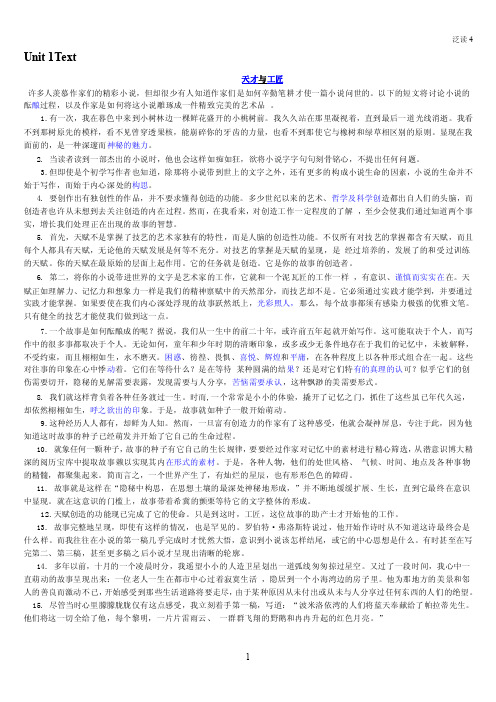
Unit 1Text天才与工匠许多人羡慕作家们的精彩小说,但却很少有人知道作家们是如何辛勤笔耕才使一篇小说问世的。
以下的短文将讨论小说的酝酿过程,以及作家是如何将这小说雕琢成一件精致完美的艺术品。
1.有一次,我在暮色中来到小树林边一棵鲜花盛开的小桃树前。
我久久站在那里凝视着,直到最后一道光线消逝。
我看不到那树原先的模样,看不见曾穿透果核,能崩碎你的牙齿的力量,也看不到那使它与橡树和绿草相区别的原则。
显现在我面前的,是一种深邃而神秘的魅力。
2. 当读者读到一部杰出的小说时,他也会这样如痴如狂,欲将小说字字句句刻骨铭心,不提出任何问题。
3.但即使是个初学写作者也知道,除那将小说带到世上的文字之外,还有更多的构成小说生命的因素,小说的生命并不始于写作,而始于内心深处的构思。
4. 要创作出有独创性的作品,并不要求懂得创造的功能。
多少世纪以来的艺术、哲学及科学创造都出自人们的头脑,而创造者也许从未想到去关注创造的内在过程。
然而,在我看来,对创造工作一定程度的了解,至少会使我们通过知道两个事实,增长我们处理正在出现的故事的智慧。
5. 首先,天赋不是掌握了技艺的艺术家独有的特性,而是人脑的创造性功能。
不仅所有对技艺的掌握都含有天赋,而且每个人都具有天赋,无论他的天赋发展是何等不充分。
对技艺的掌握是天赋的显现,是经过培养的,发展了的和受过训练的天赋。
你的天赋在最原始的层面上起作用。
它的任务就是创造。
它是你的故事的创造者。
6. 第二,将你的小说带进世界的文字是艺术家的工作,它就和一个泥瓦匠的工作一样,有意识、谨慎而实实在在。
天赋正如理解力、记忆力和想象力一样是我们的精神禀赋中的天然部分,而技艺却不是。
它必须通过实践才能学到,并要通过实践才能掌握。
如果要使在我们内心深处浮现的故事跃然纸上,光彩照人,那么,每个故事都须有感染力极强的优雅文笔。
- 1、下载文档前请自行甄别文档内容的完整性,平台不提供额外的编辑、内容补充、找答案等附加服务。
- 2、"仅部分预览"的文档,不可在线预览部分如存在完整性等问题,可反馈申请退款(可完整预览的文档不适用该条件!)。
- 3、如文档侵犯您的权益,请联系客服反馈,我们会尽快为您处理(人工客服工作时间:9:00-18:30)。
Unit1天才与工匠许多人羡慕作家们的精彩小说,但却很少有人知道作家们是如何辛勤笔耕才使一篇小说问世的。
以下的短文将讨论小说的酝酿过程,以及作家是如何将这小说雕琢成一件精致完美的艺术品。
有一次,我在暮色中来到小树林边一棵鲜花盛开的小桃树前。
我久久站在那里凝视着,直到最后一道光线消逝。
我看不到那树原先的模样,看不见曾穿透果核,能崩碎你的牙齿的力量,也看不到那使它与橡树和绿草相区别的原则。
显现在我面前的,是一种深邃而神秘的魅力。
当读者读到一部杰出的小说时,他也会这样如痴如狂,欲将小说字字句句刻骨铭心,不提出任何问题。
但即使是个初学写作者也知道,除那将小说带到世上的文字之外,还有更多的构成小说生命的因素,小说的生命并不始于写作,而始于内心深处的构思。
要创作出有独创性的作品,并不要求懂得创造的功能。
多少世纪以来的艺术、哲学及科学创造都出自人们的头脑,而创造者也许从未想到去关注创造的内在过程。
然而,在我看来,对创造工作一定程度的了解,至少会使我们通过知道两个事实,增长我们处理正在出现的故事的智慧。
首先,天赋不是掌握了技艺的艺术家独有的特性,而是人脑的创造性功能。
不仅所有对技艺的掌握都含有天赋,而且每个人都具有天赋,无论他的天赋发展是何等不充分。
对技艺的掌握是天赋的显现,是经过培养的,发展了的和受过训练的天赋。
你的天赋在最原始的层面上起作用。
它的任务就是创造。
它是你的故事的创造者。
第二,将你的小说带进世界的文字是艺术家的工作,它就和一个泥瓦匠的工作一样,有意识、谨慎而实实在在。
天赋正如理解力、记忆力和想象力一样是我们的精神禀赋中的天然部分,而技艺却不是。
它必须通过实践才能学到,并要通过实践才能掌握。
如果要使在我们内心深处浮现的故事跃然纸上,光彩照人,那么,每个故事都须有感染力极强的优雅文笔。
只有健全的技艺才能使我们做到这一点。
一个故事是如何酝酿成的呢?据说,我们从一生中的前二十年,或许前五年起就开始写作。
这可能取决于个人,而写作中的很多事都取决于个人。
无论如何,童年和少年时期的清晰印象,或多或少无条件地存在于我们的记忆中,未被解释,不受约束,而且栩栩如生,永不磨灭。
困惑、徬徨、畏惧、喜悦、辉煌和平庸,在各种程度上以各种形式组合在一起。
这些对往事的印象在心中悸动着。
它们在等待什么?是在等待某种圆满的结果?还是对它们特有的真理的认可?似乎它们的创伤需要切开,隐秘的见解需要表露,发现需要与人分享,苦恼需要承认,这种飘渺的美需要形式。
我们就这样背负着各种任务渡过一生。
时而,一个常常是小小的体验,撬开了记忆之门,抓住了这些虽已年代久远,却依然栩栩如生,呼之欲出的印象。
于是,故事就如种子一般开始萌动。
这种经历人人都有,却鲜为人知。
然而,一旦富有创造力的作家有了这种感受,他就会凝神屏息,专注于此,因为他知道这时故事的种子已经萌发并开始了它自己的生命过程。
就象任何一颗种子,故事的种子有它自己的生长规律,要要经过作家对记忆中的素材进行精心筛选,从潜意识博大精深的阅历宝库中提取故事赖以实现其内在形式的素材。
于是,各种人物,他们的处世风格、气候、时间、地点及各种事物的精髓,都聚集起来。
简而言之,一个世界产生了,有灿烂的星辰,也有形形色色的障碍。
故事就是这样在“隐秘中构思,在思想土壤的最深处神秘地形成,”并不断地缓缓扩展、生长,直到它最终在意识中显现。
就在这意识的门槛上,故事带着希冀的颤栗等待它的文字整体的形成。
天赋创造的功能现已完成了它的使命。
只是到这时,工匠,这位故事的助产士才开始他的工作。
故事完整地呈现,即使有这样的情况,也是罕见的。
罗伯特·弗洛斯特说过,他开始作诗时从不知道这诗最终会是什么样。
而我往往在小说的第一稿几乎完成时才恍然大悟,意识到小说该怎样结尾,或它的中心思想是什么。
有时甚至在写完第二、第三稿,甚至更多稿之后小说才呈现出清晰的轮廓。
多年以前,十月的一个凌晨时分,我遥望小小的人造卫星划出一道弧线匆匆掠过星空。
又过了一段时间,我心中一直萌动的故事呈现出来:一位老人一生在都市中心过着寂寞生活,隐居到一个小海湾边的房子里。
他为那地方的美景和邻人的善良而激动不已,开始感受到那些生活道路将要走尽,由于某种原因从未付出或从未与人分享过任何东西的人们的绝望。
尽管当时心里朦朦胧胧仅有这点感受,我立刻着手第一稿,写道:“波米洛依湾的人们将蓝天奉献给了帕拉蒂先生。
他们将这一切全给了他,每个黎明,一片片雷雨云、一群群飞翔的野鹅和冉冉升起的红色月亮。
”当时我在干什么?我在描绘一个奇怪的才能:而且还有更多奇怪的才能。
接着我升上高空;尔后飞向运行中的万千星辰。
当我写到小说的结尾时,我不禁感到诧异,我开始写第一段时居然对整个小说毫无了解:每一个字都指出方向。
然而,我浑然不知时,我为什么动笔写作?我在干什么?我是在实施工匠的三个功能中的两个:信赖,第二:写作。
不论我的小说会是什么样,我坚信小说的灵性,它的真实性;不论它可能在何时显现,我都坚信它的完整性和它的形式。
在写作中我听任它发展,迎候它的显现。
我在为它的显现提供载体,否则它又怎能显现呢?信赖你的天赋吧,它是你的创造性功能,它的任务就是创造。
因为它在最原始的层面上起作用,因此,它所创造的小说是独一无二的。
这故事完全是你自己的。
没其他人能了解它,也没人能写出它。
这就是一个小说的价值,唯一的价值。
尊重你的创造性功能,依靠它获得智慧:它不是盲目冲动的产物,而是工作的原则。
信赖它,为它感到欣喜,运用它。
这正是培养天赋的奥秘所在,也是真正能力的开端。
信赖并着手写作。
当你开始感到小说急不可待的脉动时,就动笔写作。
如果你对它并不完全了解,就尽你所知去写。
逐个地写你所知道的那部分,要有耐心,不久你就会完全知道你所写的是什么。
假如你写得不好,那就尽你所能去写。
务必竭尽全力,以你当时所能驾驭的全部智慧努力写得明白清晰。
如果能这样做并坚持不懈,你一定能稳步提高。
因为认真踏实的工作可以真正发展智力。
不懈的实践可以真正形成技能,而形成技能就是工匠的第三个任务。
以你最好的文笔尽你所能写每一个故事,每一封信,如果你写日记的话,要这样在日记中记每一件事。
要写好。
要写得有技巧。
要写得优雅,如果你能够的话,要写得完美。
对任何成文的材料都应力求谨慎、真实。
任何低于当时你所能达到的完美程度的文字都谈不上是技艺,而是浅尝輒止的儿戏。
初事写作者总是力图尽量快捷、高效地找到适合他的写作方法,以求省时省力。
谈起方法,我们都知道写作不是教会的,而是学会的。
但是常识——天赋的狡诘的侍女却告诉我们,实际从事写作者象日复一日干着同一工作的管子工、从政者和金银首饰匠一样,谈起他们的工作都很在行。
读作家们所写的书,听作家们所说的话,你就可以发现他们的工作习惯中有许多与自己相同的偏爱和冲动。
你会发现这些不仅是你自己独有的癖好,而往往是从事写作者的性情中特有的,极其重要的几种癖性。
它们对你有利,可以为你所用。
我每天写作四小时,一连写了十年之后,才发表作品。
在写作过程中,我没有老师指导,也没有写作的书籍可供参考。
我花了很长时间才发现了一种写作方法。
多年之后,一位十分优秀的教师说:“要知道,好小说不是写成的而是改成的。
”当时,我沉思着回答说:“是啊!我明白。
但愿早就有人告诉我。
”我处理小说的方法简单而行之有效。
当一个故事在我脑海中呈现出来,当我朦胧地感觉到它的显现,就迅速将它草拟成一个提纲。
不久,也许就在次日,我就通篇重写,这一次不可避免地会加进更多内容并填补很多缺漏。
我总是对小说进行整体处理。
每隔一段时间我就继续重写,再将其搁在一边冷一段时间,然后根据需要反复重写,直到文字流畅、妥贴。
我总是试图用词准确,贴切,就象将湿绸缎紧裹在身上那样,努力使文字简明练达。
目的是有魔力的。
当你以追求卓越为目的而写作时,无论你的工作如何艰辛,它绝不会单调乏味。
不论你的工作成果如何不如人意,只要你不愿裹足不前就绝不是失败。
以这种方式重写不是乏味的苦工而是技艺上的探索。
如果你将小说当作活生生、有灵性的整体来对待,修改就有活力,因为在此过程中有三件事同时发生:第一,你达到了对整个故事的完全了解。
你几乎不能相信,在写第一、第二稿时,你对这个故事的了解是何等不足,直到第四第五稿,你才能领悟到这一点。
它一层层地显示出来;起先不受关注的小事件渐渐变得重要;含混处变得清晰。
在反复阅读的过程中闪过眼前的事物向你跳跃,以引起注意。
对这个故事的彻底理解给了你控制力,而这种控制力使你能将故事写到最好。
因为你知道你在做什么。
彻底了解一个故事也为你了解下一个故事做好了充分的准备。
你在写它的第一稿时就不会再感到困惑或束手无策。
尽管还会有种种缺憾,内容模糊不清或行文粗劣,你仍可以认为这是你写的最好的东西。
你会自信地去修改,确信它会逐步完善,第二,你取得了一种其它任何练习、书籍乃至无论知识如何渊博的老师都所不能给你的技能。
在一次又一次解决情节问题、写作问题的过程中,你学会了如何高效地工作;你学习了新的方法,而最重要的是,你获得了自己的方法。
重读往往宽容写作中的错误,而重写则往往揭示出错误。
不自然地过分炫耀词藻,常常在重写时暴露无遗;你自认为机智含蓄的东西,往往是对难以表述的问题的故意回避。
而这些问题对于故事而言,恰恰是至关重要而务必清晰表述的。
你的判断力和敏感性,由于你被迫面对那一个个枯燥乏味的字眼和粗劣笨拙的段落而变得敏锐起来。
每改进一个句子、一个段落,你都在提高你的技能。
渐渐地,你会看到追求卓越并非空泛的梦想,而是一种可能。
第三,修改是修改,作家的工作是写作。
阅读、听课、与专事写作的作家们交谈都是极为有益的,但它们只在你致力于写作时才有帮助。
修改为脚踏实地的写作指明了目标,而这一目标会给予你终身受益的回报,即不断提高的技能。
修改有助于形成习惯,而世上再也没有比工作的习惯更能激发才智的了。
绝不要强加给你的能力任何限制,也绝不允许任何人这样做。
一旦力求完美成为你的习惯,你就会领悟到杰作并不神秘,也绝非偶然,而是一种生活方式的结果。
Dccbd cbba abcdb ddbaa2. A writer needs creative power in producing good stories. He has tomake painstaking efforts in writing. Creative power needs cultivation and genius alone may not work in creating original stories.3. In most cases a good story is rewritten. But there are writers who think very carefully about the story to be written before they start writing. Careful thinking and rewriting are of the same nature here.Unit3食品大战杰弗里·克卢杰现在,基因改造作物越来越多的,而且成为了我们日常食品的一部分。
